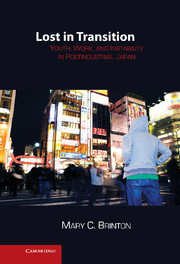Book contents
- Frontmatter
- Contents
- Figures
- Tables
- Preface
- Acknowledgments
- Lost in Transition
- 1 The Lost Generation
- 2 The Historical Roots of Japanese School-Work Institutions
- 3 The Importance of Ba, the Erosion of Ba
- 4 Unraveling School-Employer Relationships
- 5 Networks of Advantage and Disadvantage for New Graduates
- 6 Narratives of the New Mobility
- 7 The Future of the Lost Generation
- References
- Index
1 - The Lost Generation
Published online by Cambridge University Press: 05 June 2012
- Frontmatter
- Contents
- Figures
- Tables
- Preface
- Acknowledgments
- Lost in Transition
- 1 The Lost Generation
- 2 The Historical Roots of Japanese School-Work Institutions
- 3 The Importance of Ba, the Erosion of Ba
- 4 Unraveling School-Employer Relationships
- 5 Networks of Advantage and Disadvantage for New Graduates
- 6 Narratives of the New Mobility
- 7 The Future of the Lost Generation
- References
- Index
Summary
“People in my parents’ generation seem to remember the world as having been a more energetic and lively place when they were in their thirties. It’s different now. Even though everyone says the economy is recovering, there is no feeling of energy – just kind of a gloomy atmosphere.”
– Twenty-eight-year-old male graduate of a low-ranking public general high schoolKakusa. NEET. Furītā. Parasaito shinguru. Hikikomori. Wākingu puā. Net-café refugees. Shōshika. Japanese newspapers, magazines, and books are filled with terms such as these, emblematic of a society undergoing transformation and grappling with new and bewildering social problems. To comprehend these phenomena requires an understanding of what young Japanese experienced in the 1990s when they entered adulthood. The Japanese labor market was changing under their feet, undergoing important structural transformations that made their choices and opportunities fundamentally different from the choices their parents had faced. Although young people’s work and lifestyle preferences were changing as well, more important were the changes occurring in the institutions in Japan that had supported the prior generation’s movement from school to work and into adulthood. The breakdown in school-work institutions and in employers’ guarantee of secure employment to large numbers of new graduates produced a “lost generation” in the 1990s, a cohort of young people unable to gain a stable economic toehold from which to embark on their adult lives.
Lost in the transition from school to work, the lost generation is a reflection of a deeper transition in Japanese society – a transition away from social institutions that helped guide individuals from one life stage to another. These life stages have been deeply connected in Japan to what we might call the “social locations” in which individuals find security and a sense of identity. The rupture in the social institutions guiding individuals into such social locations has profound implications, as it requires individuals to master new sets of skills to navigate what have become rocky and at times lonely transitions. The costs of these recent institutional changes in Japan have been borne mainly by the young, especially the least educated among them.
- Type
- Chapter
- Information
- Lost in TransitionYouth, Work, and Instability in Postindustrial Japan, pp. 1 - 33Publisher: Cambridge University PressPrint publication year: 2010



